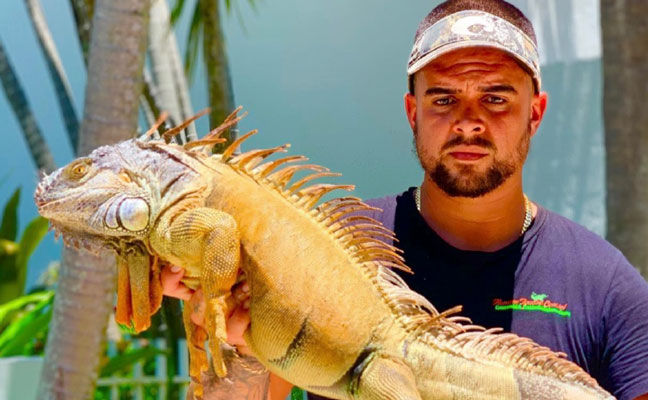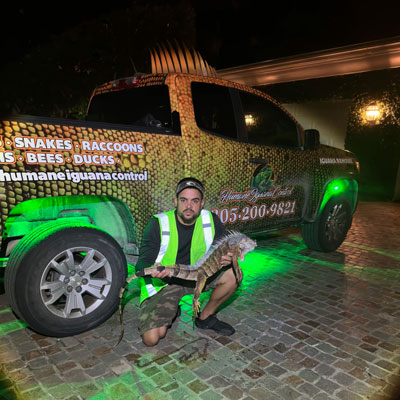
Michael Ronquillo
As pest management professionals (PMPs), it is crucial to stay well-informed about the latest techniques and strategies for controlling invasive species. In particular, addressing the challenges posed by invasive iguanas requires a comprehensive approach that combines expertise, insights, and practical solutions. In this article, we will delve into effective iguana control strategies, focusing on the expertise and insights that PMPs can employ to tackle this growing issue.
Understanding the iguana threat
Invasive iguanas, such as the green iguana (Iguana iguana), have become a widespread problem in various regions due to their rapid reproduction, destructive feeding habits, and ability to adapt to new environments. They not only disrupt local ecosystems but also cause substantial damage to agriculture, infrastructure, and human health. This understanding of the ecological and economic impacts helps PMPs appreciate the urgency of developing and implementing effective iguana control strategies.
Integrated pest management approach
In dealing with invasive iguanas, PMPs should adopt an integrated pest management (IPM) approach. This holistic strategy emphasizes proactive prevention, cultural controls, biological controls, and targeted chemical interventions, with the ultimate aim of achieving long-term management and reducing reliance on harsh chemicals. IPM focuses on minimizing the impact on non-target species and the environment while effectively managing the iguana populations.
1. Prevention: Preventing iguana infestations is key, and professionals can advise clients on implementing measures such as securing fences, sealing entry points, tree wrapping and reducing attractants for iguanas on their properties. Through comprehensive inspections, the identification of potential entry points can be highlighted, allowing for targeted prevention efforts.
2. Cultural controls: PMPs can educate clients on cultural controls that discourage iguana presence. This can include modifying landscapes to minimize favorable iguana habitat, removing vegetation that attracts iguanas, and using deterrents such as ultrasonic devices or visual barriers.
3. Biological controls: Implementing biological control methods can be an effective and sustainable way to manage invasive iguanas. Professionals can introduce or encourage the presence of natural predators, including specific bird species such as herons or hawks, which can help control the iguana population naturally. Seeking guidance from ecologists or wildlife experts can provide valuable insights into using biological control options safely and effectively.
4. Targeted organic spray interventions: When necessary, PMPs can employ targeted organic deterrent spray interventions, but with careful consideration. Utilizing environmentally friendly products that specifically target iguanas can minimize the risk to non-target species and reduce the overall impact on the ecosystem. However, it is essential to follow regulations and label instructions diligently to ensure responsible and safe application.

Michael Ronquillo often performs iguana removal services at night. PHOTO: HUMANE IGUANA CONTROL
5. Iguana trapping: Trapping can be an effective and humane approach to reducing iguana populations, especially when combined with other control methods. It typically involves using specially designed traps that lure iguanas in, allowing PMPs to safely and efficiently remove this invasive species. Trapping requires careful planning, regular monitoring, and adherence to local regulations to ensure successful and responsible iguana management.
Monitoring and Evaluation
Iguana control is an ongoing process that requires regular monitoring and evaluation. PMPs can emphasize the significance of monitoring iguana populations, assessing the effectiveness of control methods, and making necessary adjustments to ensure long-term success. Regular communication with clients and collaborations with relevant experts facilitate the exchange of information and promote continuous improvement in iguana control techniques.
As PMPs, our expertise lies in providing effective and sustainable solutions to combat invasive species like iguanas. By adopting an IPM approach, including prevention, cultural controls, biological controls, and targeted organic spray application interventions, we can effectively manage iguana populations while minimizing adverse effects on the environment. Continued monitoring and evaluation ensure that our efforts remain successful in the long term. Let us utilize our expertise and insights to protect ecosystems, preserve biodiversity, and safeguard the interests of our clients and communities.
Check out this video from Humane Iguana Control about their iguana control entails:
Leave A Comment